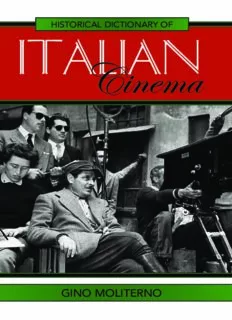
Historical Dictionary of Italian Cinema (Historical Dictionaries of Literature and the Arts) PDF
Preview Historical Dictionary of Italian Cinema (Historical Dictionaries of Literature and the Arts)
HISTORICAL DICTIONARY OF ITALIAN Cinema GINO MOLITERNO Historical Dictionaries of Literature and the Arts Jon Woronoff, Series Editor 1. Science Fiction Literature, by Brian Stableford, 2004. 2. Hong Kong Cinema, by Lisa Odham Stokes, 2007. 3. American Radio Soap Operas,by Jim Cox, 2005. 4. Japanese Traditional Theatre,by Samuel L. Leiter, 2006. 5. Fantasy Literature,by Brian Stableford, 2005. 6. Australian and New Zealand Cinema, by Albert Moran and Errol Vieth, 2006. 7. African-American Television, by Kathleen Fearn-Banks, 2006. 8. Lesbian Literature,by Meredith Miller, 2006. 9. Scandinavian Literature and Theater,by Jan Sjåvik, 2006. 10. British Radio,by Seán Street, 2006. 11. German Theater,by William Grange, 2006. 12. African American Cinema,by S. Torriano Berry and Venise Berry, 2006. 13. Sacred Music,by Joseph P. Swain, 2006. 14. Russian Theater, by Laurence Senelick, 2007. 15. French Cinema, by Dayna Oscherwitz and MaryEllen Higgins, 2007. 16. Postmodernist Literature and Theater, by Fran Mason, 2007. 17. Irish Cinema,by Roderick Flynn and Pat Brereton, 2007. 18. Australian Radio and Television,by Albert Moran and Chris Keat- ing, 2007. 19. Polish Cinema, by Marek Haltof, 2007. 20. Old Time Radio, by Robert C. Reinehr and Jon D. Swartz, 2008. 21. Renaissance Art, by Lilian H. Zirpolo, 2008. 22. Broadway Musical, by William A. Everett and Paul R. Laird, 2008. 23. American Theater:Modernism, by James Fisher and Felicia Hardi- son Londré, 2008. 24. German Cinema,by Robert C. Reimer and Carol J. Reimer, 2008. 25. Horror Cinema, by Peter Hutchings, 2008. 26. Westerns in Cinema, by Paul Varner, 2008. 27. Chinese Theater, by Tan Ye, 2008. 28. Italian Cinema,by Gino Moliterno, 2008. 29. Architecture,by Allison Lee Palmer, 2008. Historical Dictionary of Italian Cinema Gino Moliterno Historical Dictionaries of Literature and the Arts, No. 28 The Scarecrow Press, Inc. Lanham, Maryland • Toronto • Plymouth, UK 2008 SCARECROWPRESS, INC. Published in the United States of America by Scarecrow Press, Inc. Awholly owned subsidiary of The Rowman & Littlefield Publishing Group, Inc. 4501 Forbes Boulevard, Suite 200, Lanham, Maryland 20706 www.scarecrowpress.com Estover Road Plymouth PL6 7PY United Kingdom Copyright ©2008 by Gino Moliterno All rights reserved.No part of this publication may be reproduced, stored in a retrieval system, or transmitted in any form or by any means, electronic, mechanical, photocopying, recording, or otherwise, without the prior permission of the publisher. British Library Cataloguing in Publication Information Available Library of Congress Cataloging-in-Publication Data Moliterno, Gino, 1951 Historical dictionary of Italian cinema / Gino Moliterno. p. cm. (Historical dictionaries of literature and the arts ; no. 28) Includes bibliographical references. ISBN13: 9780810860735 (hardcover : alk. paper) ISBN10: 0810860732 (hardcover : alk. paper) eISBN13: 9780810862548 eISBN10: 0810862549 1. Motion pictures Italy Dictionaries. 2. Motion pictures Italy History Dictionaries. I. Title. PN1993.5.I88M56 2008 791.430945’03 dc22 2008011225 ∞™ The paper used in this publication meets the minimum requirements of American National Standard for Information Sciences Permanence of Paper for Printed Library Materials, ANSI/NISO Z39.481992. Manufactured in the United States of America. For Patricia, light of my life too soon extinguished “Or ho perduta tutta la mia baldanza che si movea d’amoroso tesoro . . . ” Contents Editor’s Foreword (Jon Woronoff) ix Preface xi Acknowledgments xii Reader’s Note xiii Acronyms and Abbreviations xv Chronology xvii Introduction xxxi THE DICTIONARY 1 Appendix: Winners at the Venice Festival and of the David di Donatello and Nastri d’argento 347 Bibliography 399 About the Author 449 vii Editor’s Foreword Italy was one of the first places where cinema emerged, and there are few other countries where it has flourished more spectacularly. Despite crises and being overshadowed by mass production from Hollywood, Italian cinema has constantly reinvented itself in an amazing variety of forms, including neorealism, which has spread worldwide. Its produc- tion is amazingly broad, from outright trash to the very finest art films—a steady flow of quite ordinary popular films but also specialties such as commedia all’italiana and spaghetti Westerns. Many have gone on to win awards and appear on all-time-great lists, including some that are so universal—and so Italian—that they are known worldwide under their Italian names, such a La strada, La dolce vita, and Padre padrone. There are more than enough reasons to welcome the Historical Dic- tionary of Italian Cinema, which can serve as an informative guide for both those who simply enjoy watching Italian films and those who study the genre more closely. Italian cinema’s long history is charted in the chronology and the introduction, but the dictionary section—with hundreds of entries on directors, producers, and actors; major studios and film companies; characteristic genres and themes; and memorable films—is where readers will spend the most time. The book concludes with an appendix of award winners and a bibliography, which readers can use to find many other sources. The author, Gino Moliterno, was born in Italy and has had an abiding interest in Italian cinema for several decades. After teaching Italian lan- guage and culture at the University of Sydney, the University of Auck- land, and the University of Wollongong, he joined the Department of Modern European Languages at the Australian National University. He is presently senior lecturer of its Film Studies Program. He has lectured extensively on Italian cinema and was the general editor and contribut- ing author to the Encyclopedia of Contemporary Italian Culture(2000). ix
Description: